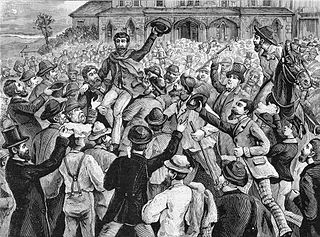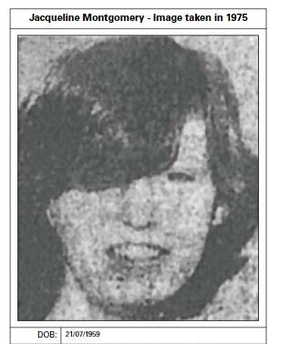In jurisprudence, double jeopardy is a procedural defence that prevents an accused person from being tried again on the same charges following an acquittal or conviction and in rare cases prosecutorial and/or judge misconduct in the same jurisdiction. Double jeopardy is a common concept in criminal law. In civil law, a similar concept is that of res judicata. Variation in common law countries is the peremptory plea, which may take the specific forms of autrefois acquit or autrefois convict. These doctrines appear to have originated in ancient Roman law, in the broader principle non bis in idem.

Mark Fuhrman is a former detective of the Los Angeles Police Department (LAPD). He is primarily known for his part in the investigation of the 1994 murders of Nicole Brown Simpson and Ron Goldman in the O. J. Simpson murder case.

In common law jurisdictions, an acquittal means that the prosecution has failed to prove that the accused is guilty beyond a reasonable doubt of the charge presented. It certifies that the accused is free from the charge of an offense, as far as criminal law is concerned. The finality of an acquittal is dependent on the jurisdiction. In some countries, such as the United States, an acquittal prohibits the retrial of the accused for the same offense, even if new evidence surfaces that further implicates the accused. The effect of an acquittal on criminal proceedings is the same whether it results from a jury verdict or results from the operation of some other rule that discharges the accused. In other countries,[which?] like Australia and the UK, the prosecuting authority may appeal an acquittal similar to how a defendant may appeal a conviction — but usually only if new and compelling evidence comes to light or the accused has interfered with or intimidated a juror or witness.
Prejudice is a legal term with different meanings, which depend on whether it is used in criminal, civil, or common law. In legal context, "prejudice" differs from the more common use of the word and so the term has specific technical meanings.
Melvin Henry Ignatow was a resident of Louisville, Kentucky, who was tried for the 1988 murder of his former girlfriend, Brenda Sue Schaefer. The case was controversial since Ignatow was acquitted of the charge, but later admitted to killing Schaefer. Under the legal principle of double jeopardy, however, Ignatow could not be tried a second time for the murder. He was instead convicted and jailed for several instances of perjury in his grand jury testimony for the case.

The Criminal Justice Act 2003 is an Act of the Parliament of the United Kingdom. It is a wide-ranging measure introduced to modernise many areas of the criminal justice system in England and Wales and, to a lesser extent, in Scotland and Northern Ireland. Large portions of the act were repealed and replaced by the Sentencing Act 2020.
Fong Foo v. United States, 369 U.S. 141 (1962), was a Supreme Court ruling that upheld the protection from double jeopardy by the federal government. While the protection from double jeopardy did not get incorporated to apply to the state governments until 1969, the Supreme Court ruled that the Fifth Amendment to the United States Constitution prevented the Federal Government from bringing a defendant to trial twice for the same charge. In this case, the court ruled that despite the error of the District Judge, the 5th Amendment protected the defendants from facing a second trial for the same charge.

Bigby v. Dretke 402 F.3d 551, the U.S. Court of Appeals for the Fifth Circuit heard a case appealed from the United States District Court for the Northern District of Texas on the issue of the instructions given to a jury in death penalty sentencing. The decision took into account the recent United States Supreme Court decisions concerning the relevance of mitigating evidence in sentencing, as in Penry v. Lynaugh.

The World's End Murders is the colloquial name given to the murder of two girls, Christine Eadie, 17, and Helen Scott, 17, in Edinburgh, in October 1977. The case is so named because both victims were last seen alive leaving The World's End pub in Edinburgh's Old Town. The only person to stand trial accused of the murders, Angus Sinclair, was acquitted in 2007 in controversial circumstances. Following the amendment of the law of double jeopardy, which would have prevented his retrial, Sinclair was retried in October 2014 and convicted of both murders on 14 November 2014. He was sentenced to life imprisonment with a minimum term of 37 years, the longest sentence by a Scottish court, meaning he would have been 106 years old when he was eligible for a potential release on parole. He died at HM Prison Glenochil aged 73 on 11 March 2019. Coincidentally, he died on the same day the BBC's Crimewatch Roadshow programme profiled the murders.
United States v. Felix, 503 U.S. 378 (1992), was a decision by the United States Supreme Court, which held that "a[n]…offense and a conspiracy to commit that offense are not the same offense for double jeopardy purposes." The Supreme Court rejected the Tenth Circuit's reversal of Felix's conviction, finding that the Court of Appeals read the holding in Grady v. Corbin (1990) too broadly.
The Double Jeopardy Clause of the Fifth Amendment to the United States Constitution provides: "[N]or shall any person be subject for the same offence to be twice put in jeopardy of life or limb..." The four essential protections included are prohibitions against, for the same offense:
Sir Colman Maurice Treacy is a retired Lord Justice of Appeal. Previously, he was a barrister in Birmingham. He presided over a number of criminal trials, including those of an Afghan warlord, Faryadi Sarwar Zardad, and two of the killers of Stephen Lawrence.
John Harris Byrne is a retired Australian jurist who previously served as Senior Judge Administrator of the Supreme Court of Queensland. Having been a judge of that court since 1989, he was one of the court's most experienced judges. He was also Chair of the National Judicial College of Australia, a body which provides programs and professional development resources to judicial officers in Australia. He is now a private Commercial Arbitrator.
United States v. Dinitz, 424 U.S. 600 (1976), was a case in which the Supreme Court of the United States determined that the U.S. Const., Amend. V protection against double jeopardy did not prevent a retrial of a defendant, who had previously requested a mistrial.

The Babes in the Wood Murders were the murders of two nine-year-old girls, Nicola Fellows and Karen Hadaway, on 9 October 1986, by a 20-year-old local roofer, Russell Bishop in Wild Park, Moulsecoomb, Brighton, Sussex, England. Bishop was tried and acquitted in 1987. The case remained open until 10 December 2018, when Bishop was found guilty of the murders in a second trial. The investigation into the two girls' murders is the largest and longest-running inquiry ever conducted by Sussex Police.
Blueford v. Arkansas, 566 U.S. 599 (2012), was a decision of the Supreme Court of the United States that clarified the limits of the Double Jeopardy Clause. The Supreme Court held that the Double Jeopardy Clause does not bar retrial of counts that a jury had previously unanimously voted to acquit on, when a mistrial is declared after the jury deadlocked on a lesser included offense.
Burks v. United States, 437 U.S. 1 (1978), is a United States Supreme Court decision that clarified both the scope of the protection against double jeopardy provided by the Fifth Amendment to the United States Constitution and the limits of an appellate court's discretion to fashion a remedy under section 2106 of Title 28 to the United States Code. It established the constitutional rule that where an appellate court reverses a criminal conviction on the ground that the prosecution failed to present sufficient evidence to prove the defendant's guilt beyond a reasonable doubt, the Double Jeopardy Clause shields the defendant from a second prosecution for the same offense. Notwithstanding the power that appellate courts have under section 2106 to "remand the cause and direct the entry of such appropriate judgment, decree, or order, or require such further proceedings to be had as may be just under the circumstances," a court that reverses a conviction for insufficiency of the evidence may not allow the lower court a choice on remand between acquitting the defendant and ordering a new trial. The "only 'just' remedy" in this situation, the Court held, is to order an acquittal.
Oregon v. Kennedy, 456 U.S. 667 (1982), was a United States Supreme Court decision dealing with the appropriate test for determining whether a criminal defendant has been "goaded" by the prosecution's bad actions into motioning for a mistrial. This matters because the answer determines whether a defendant can be retried. Ordinarily, a defendant who requests a mistrial can be forced to stand trial a second time, see United States v. Dinitz. However, if the prosecution's conduct was "intended to provoke the defendant into moving for a mistrial," double jeopardy protects the defendant from retrial. The Court emphasized that only prosecutorial actions where the intent is to provoke a mistrial — and not mere "harassment" or "overreaching" — trigger the double jeopardy protection.
Michael Weir is a British double murderer and serial burglar who was the first person in British history to have been convicted of the same crime twice. In 1999, he was jailed for the murder of 78-year-old war veteran Leonard Harris. Weir's conviction was quashed a year later at the Court of Appeal on a technicality, only for him to be re-convicted in 2019 in a 'double jeopardy' case after new evidence was found. Weir was also convicted in 2019 of the murder of 83-year-old Rose Seferian, who was also killed during a burglary five weeks after Harris, which made additional history as the first time a second murder charge was added to a double jeopardy case. Upon Weir's conviction at the Old Bailey in December 2019, judge Justice McGowan told the jury that they had made "legal history".

The murder of Jacqueline Montgomery, a 15-year-old girl from Islington, North London, United Kingdom, occurred on 1 June 1975. She was murdered by Dennis McGrory, her aunt's 28-year-old estranged partner, who was described at his trial as being "wild with rage" when he sexually assaulted, stabbed, and strangled Montgomery at her family home in Offord Road.







